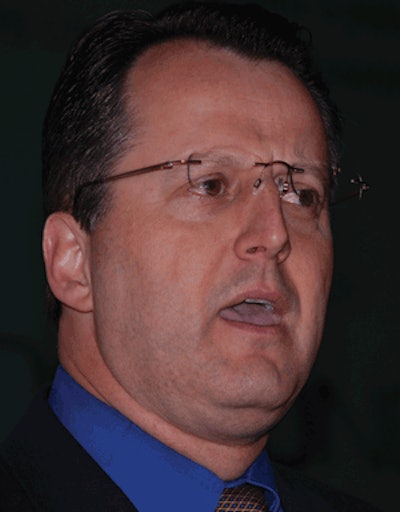
Many challenges and opportunities lie ahead, but the industry needs to maintain its social license to feed the additional 2.7 billion more people around the world in 20 years.
"One of the most crucial things to future success is the (egg industry's) ability to protect and maintain freedom to operate," Charlie Arnot, Center for Food Integrity, in the United States, said at last month's International Egg Commission conference in London.
Freedom to Operate
A company's freedom to operate could be protected by building trust, he said. Looking at trust in the food system revealed three primary drivers: influential others (those whose opinions are respected); competence (a company's ability to do what it says it will do); and confidence (trusting a company to do what is right).
"If people trust us they will grant us the social license and protect our freedom to operate," he added.
When the social benefit perceived is greater than the social cost, social license can be obtained. However, if the social cost is perceived to be greater than the social benefit, then social control can result.
Social License at Risk
In many countries that social license is under pressure. "When our customers start to tell us how to raise livestock our social license is at risk," he asserted. The reason why: consumers have less confidence in the current model of agriculture. He continued, "We have to give customers, policy makers, community leaders and consumers, permission to believe' that contemporary animal agriculture is consistent with their values and expectations." Failure to do so could result in revocation of the industry's social license and freedom to operate.
"We have to build and communicate an ethical foundation for our activity and engage in value-based communication if we want to build the trust that protects our freedom to operate."
Trust Growing for NGOs
In the United States, trust has grown in non-government organizations (NGOs) and they are now the most trusted institutions. In contrast, trust in the government has declined sharply since 2002 to a new low in 2007 when only 38 percent of the population considered the government trustworthy.
When forming an opinion of a company, "people like me" has replaced traditional institutions, such as an academic or an industry analyst, as the most trusted source of information. Indeed, the rating for "a person like me" as being the most trusted source of information has tripled from 22 percent in 2003 to 68 percent today.
NGOs are considered to be principle-driven, which has given them credibility and public standing, committed to something other than self-interest. In contrast, business is perceived to be driven by profit and that creates a credibility gap, Arnot said.
"Not being profitable is unacceptable but what we have to be able to do is to help stakeholders understand that we are not just committed to profit but that we are also committed to principle and that these aims are not mutually exclusive," he said.
In today's world, market pressure is more effective than regulation. In the United States, as a result of the activities of animal rights groups, there is a growing interest in animal welfare law.
Arnot added that the market is now trumping public policy. It is no longer waiting for regulators or legislators to establish standards and practices. "This is the new reality that we need to learn to manage," he added.
Consumer trust modeling has revealed that it is more important for the industry to communicate its commitment to do what is right than to talk about scientific validation that it is doing the right thing.


















